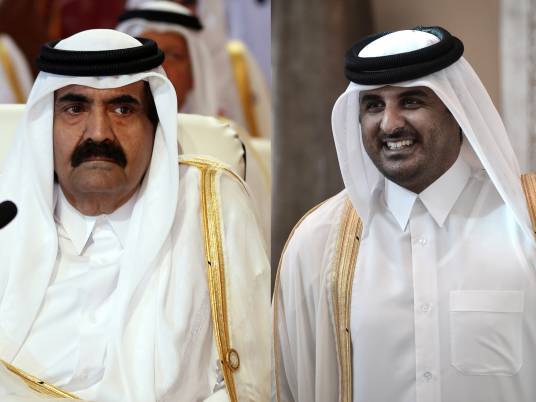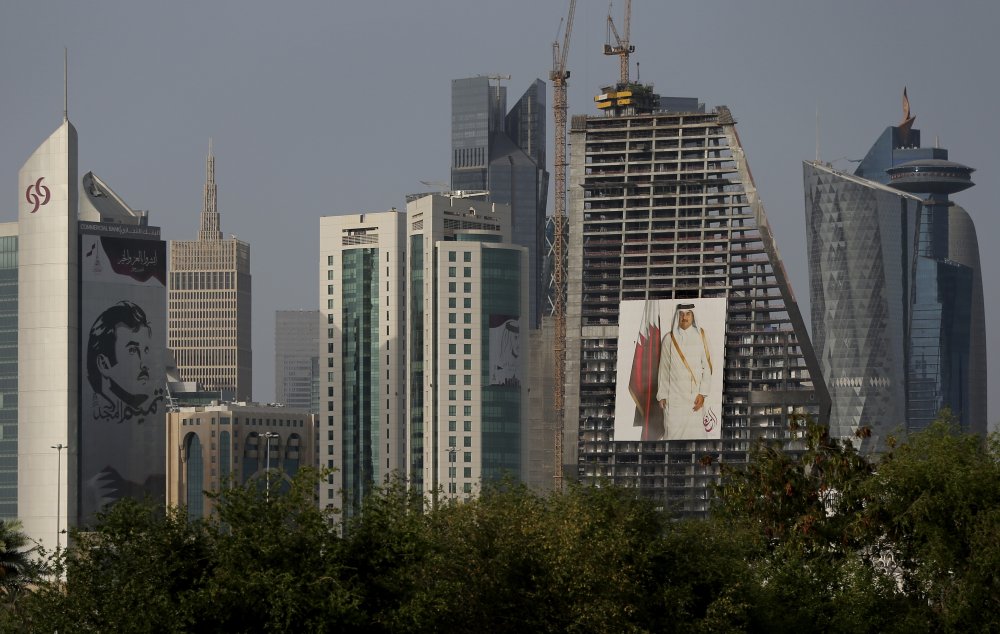
Qatar's emir Sheikh Hamad bin Khalifa al-Thani handed power on Tuesday to his son, Crown Prince Sheikh Tamim, taking the rare step for a Gulf Arab ruler of voluntarily ceding power to try to ensure a smooth succession.
But the 61-year-old emir made no immediate mention of the public face of Qatar's assertive foreign policy, prime minister and Foreign Minister Sheikh Hamad bin Jassim, a veteran politician who had been expected also to step down.
In a seven-minute speech aired on state television, the emir said it was time for a new generation to take over following his 18 years at the helm of the small, rich state.
"The time has come to open a new page in the journey of our nation that would have a new generation carry the responsibilities…with their innovative ideas," said Sheikh Hamad, reading a prepared text behind his desk, where Qatar's deep red and white flag was perched nearby.
"I address you today to inform you that I will transfer power to Sheikh Tamim bin Hamad al-Thani. I am fully confident that he is qualified for the responsibility and is trustworthy."
State television later showed streams of well wishers greeting the outgoing emir and Sheikh Tamim at the royal court.
The emir did not specify when the change would take effect but a Qatari official had said the move, once announced, would take immediate effect.
On the eve of the power transfer, Sheikh Hamad issued a decree extending the term of the advisory shura council, in effect indefinitely postponing elections that had been tentatively scheduled for the second half of the year.
The election would have been the first to the Shura Council, 30 of whose 45 members are meant to be elected, with the others appointed by the emir, under a constitution approved in 2003. All the body's current members are appointed.
Diplomats have said the emir, who overthrew his father in a bloodless coup in 1995, had long planned to abdicate in favour of 33-year-old Crown Prince Sheikh Tamim.
Tuesday was a national holiday in the country of a one-family absolute monarchy has ruled over for more than 130 years. The royal court has invited Qataris to go to swear allegiance to Sheikh Tamim on Tuesday and Wednesday.
Qatar is a small country of 2 million people but is a big exporter of natural gas, a global investment powerhouse and a financial backer of Arab Spring revolts.
In Tehran, an Iranian foreign ministry spokesman said: "Most definitely we will be watching these developments and waiting for more details…The tranquility and stability in that country and elsewhere in the region is of high importance for the Islamic Republic of Iran."
King Abdullah of Saudi Arabia, the dominant Gulf Arab power, congratulated Sheikh Tamim on his accession, according to the official Saudi Press Agency.
British Foreign Secretary William Hague said in a statement he looked forward to even stronger ties to Qatar.
The emir has elevated Qatar's global profile through the development of the Al Jazeera television network, as well as its successful bid to host the 2022 soccer World Cup tournament.
Qatari state media said Sheikh Hamad had formally informed family members and top decision makers in the U.S.-allied state of his decision at a meeting in the capital Doha on Monday.
Qatari political analyst Mohammed al-Misfer said he did not expect major changes to foreign policy or domestic plans after the handover, adding that Sheikh Tamim was already involved in running the country under his father's direction.
Arab and Western diplomats said they understood the motive was the emir's desire to have a smooth transition to a younger generation. Such a transition would be unusual for Gulf Arab states, where leaders usually die in office.
"As Tamim's succession is very much the outcome of a longer process rather than the enforced product of any sudden upheaval, there will be less sensitivity attached to the change of leadership than might otherwise be the case," said Gulf expert Kristian Ulrichsen at the Baker Institute for Public Policy.
"If anything, the decision to hand power to a younger generation confirms Qatar as the regional outlier, as a state that does things differently, meaning there is less direct comparison with other Gulf States," he said.
Qataris appeared to take the news in their stride.
"We are not surprised. The emir has been introducing his son for a long time. Hopefully, it's a good step," Khalid Mohammed, a 21-year-old Qatari student said on Monday.
Qatar has played a big role in promoting Arab Spring protests, lending significant support to rebels who toppled and killed Libyan leader Muammar Gaddafi in 2011 and to a continuing uprising against Syrian President Bashar al-Assad.
It has forged strong links with moderate Islamists especially Egypt's ruling Muslim Brotherhood group. State television showed prominent Sunni cleric Youssef al-Qaradawi, a high profile Egyptian preacher based in Qatar, greeting the outgoing emir and his son.
It has also played host to a delegation of the Afghan Taliban, which opened an office in Doha last week in preparation for expected talks with the United States about how to end a 12-year-old conflict in Afghanistan.
Other political crises and wars that Qatar has tackled include Yemen, Somalia, Lebanon, Darfur and the Palestinian territories, often arranging for peace talks on its own soil to show it can punch above its weight in international diplomacy.
But while he strongly supported Arab Spring revolts abroad, Sheikh Hamad cracked down on dissent in Qatar, where there is no freedom of expression.
In February this year a Qatari poet was jailed for 15 years for criticizing the emir and attempting to incite revolt.




